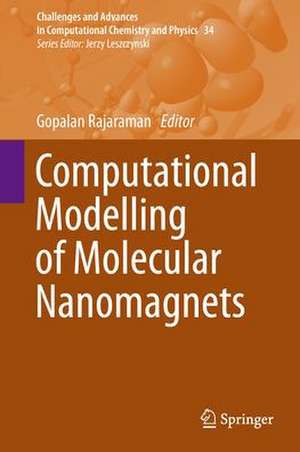Computational Modelling of Molecular Nanomagnets: Challenges and Advances in Computational Chemistry and Physics, cartea 34
Editat de Gopalan Rajaramanen Limba Engleză Hardback – 8 aug 2023
Chapter 6 is available open access under a Creative Commons Attribution 4.0 International License via link.springer.com.
Din seria Challenges and Advances in Computational Chemistry and Physics
- 18%
 Preț: 952.09 lei
Preț: 952.09 lei - 18%
 Preț: 971.01 lei
Preț: 971.01 lei - 18%
 Preț: 1382.21 lei
Preț: 1382.21 lei - 18%
 Preț: 1278.02 lei
Preț: 1278.02 lei - 18%
 Preț: 1248.83 lei
Preț: 1248.83 lei - 18%
 Preț: 1831.42 lei
Preț: 1831.42 lei - 18%
 Preț: 1833.78 lei
Preț: 1833.78 lei - 18%
 Preț: 1827.80 lei
Preț: 1827.80 lei - 18%
 Preț: 2099.59 lei
Preț: 2099.59 lei - 18%
 Preț: 1234.62 lei
Preț: 1234.62 lei - 18%
 Preț: 2108.27 lei
Preț: 2108.27 lei - 18%
 Preț: 950.84 lei
Preț: 950.84 lei - 18%
 Preț: 1235.76 lei
Preț: 1235.76 lei - 18%
 Preț: 1398.00 lei
Preț: 1398.00 lei - 18%
 Preț: 1246.78 lei
Preț: 1246.78 lei - 24%
 Preț: 1994.32 lei
Preț: 1994.32 lei - 18%
 Preț: 1226.73 lei
Preț: 1226.73 lei - 18%
 Preț: 2488.36 lei
Preț: 2488.36 lei - 18%
 Preț: 2484.74 lei
Preț: 2484.74 lei - 18%
 Preț: 1125.55 lei
Preț: 1125.55 lei - 18%
 Preț: 1119.87 lei
Preț: 1119.87 lei - 18%
 Preț: 786.36 lei
Preț: 786.36 lei - 18%
 Preț: 962.66 lei
Preț: 962.66 lei - 18%
 Preț: 1827.63 lei
Preț: 1827.63 lei - 18%
 Preț: 1114.34 lei
Preț: 1114.34 lei - 15%
 Preț: 643.16 lei
Preț: 643.16 lei - 18%
 Preț: 1105.82 lei
Preț: 1105.82 lei - 18%
 Preț: 1123.19 lei
Preț: 1123.19 lei - 20%
 Preț: 1165.69 lei
Preț: 1165.69 lei - 18%
 Preț: 1115.94 lei
Preț: 1115.94 lei
Preț: 1070.77 lei
Preț vechi: 1408.90 lei
-24% Nou
Puncte Express: 1606
Preț estimativ în valută:
204.89€ • 213.50$ • 169.65£
204.89€ • 213.50$ • 169.65£
Carte tipărită la comandă
Livrare economică 31 martie-05 aprilie
Preluare comenzi: 021 569.72.76
Specificații
ISBN-13: 9783031310379
ISBN-10: 3031310373
Pagini: 499
Ilustrații: XII, 499 p. 181 illus., 172 illus. in color.
Dimensiuni: 155 x 235 mm
Greutate: 1 kg
Ediția:1st ed. 2023
Editura: Springer International Publishing
Colecția Springer
Seria Challenges and Advances in Computational Chemistry and Physics
Locul publicării:Cham, Switzerland
ISBN-10: 3031310373
Pagini: 499
Ilustrații: XII, 499 p. 181 illus., 172 illus. in color.
Dimensiuni: 155 x 235 mm
Greutate: 1 kg
Ediția:1st ed. 2023
Editura: Springer International Publishing
Colecția Springer
Seria Challenges and Advances in Computational Chemistry and Physics
Locul publicării:Cham, Switzerland
Cuprins
Ab initio investigation of anisotropic magnetism and magnetization blocking in metal complexes.- Analytical derivations for the description of magnetic anisotropy in transition metal complexes.- Calculations of Magnetic Exchange in Multinuclear Compounds.- Exact diagonalization techniques for quantum spin systems.- Modeling magnetic properties of actinide complexes.- Spin-Phonon Relaxation in Magnetic Molecules: Theory, Predictions and Insights.- Ab initio Modelling of Lanthanide Based Molecular Magnets: Where to from Here?.- Molecular Magnets on Surfaces: in silico recipes for a successful marriage.- Theoretical Approaches for Electron Transport through Magnetic Molecules.
Notă biografică
Prof. Gopalan Rajaraman is a Institute Chair Professor at the Department of Chemistry of the Indian Institute of Technology Bombay, Mumbai, India. His research focuses on modelling the magnetic properties of molecular magnets, using DFT and ab initio methods. Prof. Rajaraman has published more than 200 research articles in lanthanide magnets, {3d-4f} SMMs, transition metalsingle-ion magnets, polynuclear single molecule magnets etc. Recently his group is utilizing DFT and ab initio methods to predict robust SMMs based on coordination and endohedral fullerene molecules, many of which are proved by experiments.
Textul de pe ultima copertă
This book summarizes the state-of-the-art advances in the area of computational modelling of molecule-based magnets. Nowadays, various computational tools based on DFT, ab initio methods and other techniques are gaining attention in molecular nanomagnets and are successfully used to solve several outstanding problems in this area. This contributed volume discusses the theoretical foundation of the modelling of molecular magnets, starting from fitting the experimental magnetic data of very large molecules to the theory of pseudo-spin Hamiltonian approach and spin-phonon relaxations mechanisms, while it also presents examples of contemporary applications of both transition metal and lanthanide molecular magnets. In addition, the transport characteristics of molecules when placed at an interface and how these assemble on surfaces are also reviewed. This book is a great tool for researchers working in the fields of molecular magnetism and computational/theoretical chemistry and will also benefit graduate students specializing in physical-inorganic chemistry and molecular modelling.
Chapter 6 is available open access under a Creative Commons Attribution 4.0 International License via link.springer.com.
Caracteristici
Includes theory on fitting experimental magnetic data Covers theoretical foundations as well as applications Contributions are written by experts in the field
